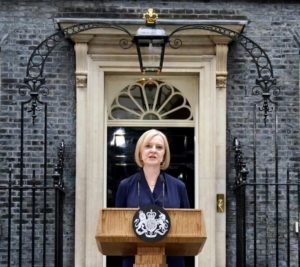Last Monday, Liz Truss became Boris Johnson’s successor as leader of the Conservative Party. She won the support of 57% of Tory party members, which corresponded to winning the votes of 0.13% of the UK’s population. Yesterday, Boris Johnson met the Queen to tender his resignation, after which the Queen appointed Liz Truss as the new Prime Minister. She is the 4th Tory Prime Minister in just 6 years and the 9th UK Prime Minister since World War II that Scotland didn’t vote for.

Europeans who hope that the new Prime Minister will mark a radical shift from Boris Johnson will be severely disappointed. Liz Truss’s victory promises a continuation of the irresponsible, populist and bombastic politics with which Boris Johnson brought the UK government into disrepute. Johnson had to resign in July due to a litany of scandals and his serial deception of the public. Truss stuck with Johnson even when it was clear he misled Parliament.
Exactly like Johnson, she appears to have no long term beliefs nor lifelong principles: just like Johnson, Truss’s stance on Brexit has shifted (from Remainer to staunch Brexiteer) based on political opportunism over any kind of genuine belief – let alone what’s “best for the people”. According to her Oxford tutor “her most noticeable characteristic is a capacity to shift, unblinkingly, from one fiercely held belief to another”.
During her one year tenure as foreign secretary Liz Truss demonstrated a willingness to use her job as Foreign Secretary not for diplomacy and mutually beneficial relations with other countries but to appeal to conservative voters in the UK. She introduced the highly controversial Northern Ireland bill – widely regarded as a breach of international law – in order to save “the spirit of Brexit” despite the majority wishes of voters in Northern Ireland.
She made a number of provocative remarks after the Russian invasion of Ukraine that caused alarm in many NATO states and raised eyebrows in Washington, seemingly to boost her popularity among the trigger-happy far right of the Tory Party that has now catapulted her into Downing Street.
Also, in an off-hand remark during the Tory leadership campaign, Truss told a journalist that “the jury [was] out” on whether or not France’s President, Emmanuel Macron, was a friend or enemy of the United Kingdom (Macron responded that “regardless of its leaders, and sometimes in spite of its leaders” France regarded the UK and all its citizens as friends).
In her victory speech Truss lavished Boris Johnson with praise, concluding that he was “admired from Kiev to Carlisle”. Her shoutout to England’s northernmost city didn’t go unnoticed in Scotland revealing, as Lesley Riddoch put it, an unintentional recognition of Scotland’s very different political outlook. Truss, like Johnson, enjoys virtually no support in Scotland and there is sadly no doubt that she will make no attempt to represent the interests of voters that would never endorse her.
As regards Scotland, Truss has consistently flexed her muscles stressing that she wouldn’t grant the referendum that has been repeatedly demanded by voters. Scotland’s First Minister Nicola Sturgeon (who, unlike Truss, enjoys a large electoral mandate, as well as respect on the international stage) was labelled an “attention seeker” by the new British Prime Minister. Truss proudly announced that she was going to “ignore” the First Minister, and by extension, the majority of Scottish voters whose interests Sturgeon represents.
Regardless of individual political stances, we believe that it is simply not acceptable to “ignore” a democratically elected leader. As proud members of the EU, we cannot stand for any such undemocratic approach to politics. Which is why we want to get EU leaders to abandon their policy of non-interference and speak up against what the current Tory administration has been doing in (and to) the UK. Many MEPs have already expressed their solidarity to Scotland, as we will show in an oncoming social media campaign. However, we need more.
We need to reach as many signatures as possible on our petition and lobby EU politicians in Brussels. You can help us by spreading the word among your friends and family, getting them to sign, by donating and helping us fund our campaign, or by joining our team and getting involved first-hand. Please do remember that every little helps, and even big changes are achieved a small step at a time!
We count on you to help us exert the level of international pressure that alone can guarantee Scotland’s right to self-determination and democracy.
With European friendship and solidarity
EfS team